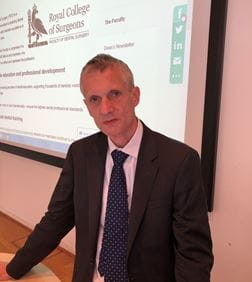2019 FDS Research Day
17 Jul 2019
FDS Research Day, 14 June 2019
Current research in oral disease – solutions and challenges.
 The objective of this meeting was to provide trainees with a clear understanding of the landscape of clinical academia in the UK. The speakers were international leaders of clinical research as evidenced by their successful track record of grant securement, generation of high quality original research papers, research supervision and/or influence upon national and international health care policy. Each speaker detailed the many challenges that they had to overcome to have such successful and fruitful careers as well as provided highlights of their recent research activities.
The objective of this meeting was to provide trainees with a clear understanding of the landscape of clinical academia in the UK. The speakers were international leaders of clinical research as evidenced by their successful track record of grant securement, generation of high quality original research papers, research supervision and/or influence upon national and international health care policy. Each speaker detailed the many challenges that they had to overcome to have such successful and fruitful careers as well as provided highlights of their recent research activities.
Representing Oral and Maxillofacial Surgery, Professor Richard J Shaw (Professor of Head and Neck Surgery, University of Liverpool) emphasized the importance to plan a long term strategy that commences from small seeds of achievable research and that important research questions often cannot be addressed without the creation of strong collaborative groups. He emphasized how research findings, for example his work on the changing prevalence of Human Papilloma Virus (HPV) associated oral and/or pharyngeal malignancy, influence national health care policies that will ultimately benefit large populations. Stefano Fedele (Professor of Oral Medicine, UCL Eastman Dental Institute) in relation to Oral Medicine demonstrated that securement of research funding can be frustrating but once achieved, as he has done, has allowed him to develop innovative methods of developing novel methods to improve salivary gland function, lessen the adverse effects of radiotherapy or risk of medication related osteonecrosis.
Francesco D’Auito (Professor of Periodontology, UCL Eastman Dental Institute) detailed the results of his group’s research of the bidirectional interplay between periodontal and systemic inflammation. His recent work has revealed that inflammation of the periodontal tissues can alter systemic metabolic control (for example in diabetes mellitus) that could in turn adversely impact upon risk of cardiovascular disease. He further demonstrated that engagement with patient support groups and policy makers can lead to enhancement of clinical guidelines for general medical as well as dental practice.
Aspects of research allied to Orthodontics were succinctly considered by Martyn Cobourne (Professor of Orthodontics, KCL Dental Institute). While echoing the experiences of previous speakers Martyn emphasized the clinical, and perhaps economic impact of high quality, challenging, research upon patients and the public. Claims made by commercial groups are sometimes, and possibly often, not as robust as suggested and that engagement with industry to drive forward joint research is often complex and potentially frustrating. Helen Rodd (Professor of Paediatric Dentistry, University of Sheffield) detailed her career progression through which the audience learnt that research emphasis may change and yet remain highly successful – she initially having a focus in neuroscience and yet now specializes in aspects of social science. Similar to the other speakers Helen emphasized that an active research career has enhanced he clinical skills and drive with respect to Paediatric dentistry.
The many twists and turns of research allied to Dental Public Health were extensively reviewed by Richard Watt (Professor of Dental Public Health, University College London). Richard outlined how his research has identified the potential of primary care oral health providers to provide preventative advice on lifestyle changes (e.g. alcohol consumption) and how socioeconomic inequality pervades oral disease and oral health care. The importance of the National Institute for Healthcare Research (NIHR) to research funding and training was heighted by Richard – who is one of the few NIHR Senior Investigators allied to oral health.
Peter Brennan (Professor of Oral and Maxillofacial Surgery, University of Portsmouth) considered the highs and “do’s and don’ts” of research publication. Through reviewing his career, Peter demonstrated that sometimes a simple, well described clinical observation later published as a case report can later evolve into important original research works that may influence clinical practice. He provided important insight into the expectations of journals and editors, highlighted that submissions must be relevant to a journal’s mission and that authors, regardless of their status must address the concerns of reviewers quickly, accurately – and politely.
Drs Freya Smith-Jack and Carla Flemming (University of Bristol) discussed how Higher Education England wishes to shape the academic strategy of “Advancing Dental Care. This presentation itself included an element of research as Freya and Carla invited all attendees to participate in real-time surveys – that achieved response rates of 100%! Professor Stephen Porter (Institute Director, UCL Eastman Dental Institute) completed the day by reviewing the need and demand for research allied to oral health and the career pathways in clinical academia in the UK. He emphasised that the Faculty of Dental Surgery has a long term commitment to research of relevance (for example by virtue of its funding of pump priming grants and fellowships) as only by advancing knowledge can disease be better treated or prevented - and hence lessen any personal or societal burden.
Professor Stephen Porter
Chair, FDS Research Committee
